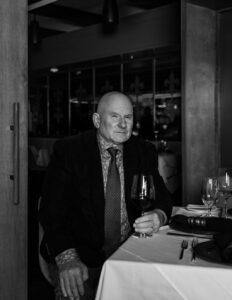 Chevalier de l’Ordre National du Mérite Agricole de la République Française
Chevalier de l’Ordre National du Mérite Agricole de la République Française
Knighted as Chevalier of the Agricole National Order of Merit from the French Republic
Born in North Africa “Sidi-Bel-Abbes” and Raised in France by Polish Grand-Parents, Chef Jacques Fox Demonstrated an Early Aptitude for Cooking Even Before He Graduated From High School in 1973. After Graduation, Chef Jacques Attended a Two Years Culinary Program at College D’Enseignement Technique, Le Marquisat in Tulle, France. Chef Jacques Arrived in Paris in 1975 and Worked at Maison Prunier, a Famous Seafood Restaurant.
(click “read more” above)
 In 1976, Chef Jacques Joined Elitair Maxims, Where He Became Executive Chef after Four Years. Chef Jacques Left Paris in 1983 to be an Executive Chef for the World Renowned Club Mediterrannee (“Club Med”), Working at Resorts in Sicily (Kamarina), New Caledonia (Noumea), Haiti (Port au Prince), Maldives Islands (Farakulafushi), Greece (Kos), Israel (Eilat), the United States of America (Cooper Mountain) and France (Les Menuires and Tignes).
In 1976, Chef Jacques Joined Elitair Maxims, Where He Became Executive Chef after Four Years. Chef Jacques Left Paris in 1983 to be an Executive Chef for the World Renowned Club Mediterrannee (“Club Med”), Working at Resorts in Sicily (Kamarina), New Caledonia (Noumea), Haiti (Port au Prince), Maldives Islands (Farakulafushi), Greece (Kos), Israel (Eilat), the United States of America (Cooper Mountain) and France (Les Menuires and Tignes).
Chef Jacques Has Also Worked for The Four-Star Hotel Bentley (Alexandria, Louisiana); the Nassau Bay Hilton and Marina (Nassau Bay, Texas); Open Moody Gardens, a Multi-Million Dollar Property (Galveston, Texas); and the Wentletrap Restaurant in the Five Star Tremont House Hotel (Galveston, Texas). He Is a Certified Executive Chef (C.E.C.) and a Member of La Confrerie de la Chaine des Rotisseurs with Which He Held the Title of Conseiller Culinaire des Etats-Unis (He was a National Board Member In-Charge the Young Chef Competition for Seven Years). During that time, Chef Jacques traveled through United State and the World to Different Culinary School Site Including, Vienna Australia, Istanbul Turkey, Paris France, Cape Town South Africa, Bermuda, Calgary/Banff Canada and Singapore. Chef Jacques Is now Conseiller Culinaire Honoraire des Etats-Unis, Conseil D’Honneur & Officier Commandeur. He is also a Board Member of the Escoffier Society & Board Member of the FACC Houston (French American Chamber of Commerce of Houston).
Chef Jacques was the Executive Chef at the Conrad N. Hilton College of Hotel and Restaurant Management at the University of Houston. This includes the 86 Room University of Houston Hilton Hotel and Conference Center with 30,000 Square Feet of Meeting Space, Two Full-Service Restaurant Operations and Fred Parks Wine Cellar. In Addition to His Culinary Work, Chef Jacques Is a Certified Hospitality Educator (C.H.E.) from the American Hotel and Motel Association Educational Institute. Chef Jacques Guests Lectures Hotel and Restaurant Management Undergraduate Students in a Course Known as: Barron’s International Dinner Series. Chef Jacques Also Coordinates a Culinary Cooking Series with Radio Station FM 99.1 and FM 96.5 and Team Tough Conrad N. Hilton College Continuing Education Classes on a Wide Variety of Culinary Aspects from Army Club Management to Bed and Breakfast Operations. Chef Jacques Also Presented “The Chef’s Club” Every Month, a Journey into the Realm of Culinary Delights.
Chef Jacques Was the Director of Education for Alain & Marie Lenôtre Culinary School in Houston Texas, Lenôtre Culinary School Emphasize in Classical French with Modern Techniques.
Chef Jacques Participated in Continental Airline Cooking Workshop, Wine Tasting and Chef-on-Board Call (Congress of Chef).
Chef Jacques was Also the Executive Chef for the Briar Club in Houston Texas, an Upscale City Club Situated in River Oak and the Executive Chef at Miramont Country Club in Bryan College Station Texas, Miramont “an Italian Castle” Embraced the Most Ambitious and Luxurious Master Planned Resort and Residential Community in the Region, Named Top 10 Golf Course in Texas.
Chef Jacques was also the Executive Chef F&B Director of the Briarcrest Country Club, 125-acre Memorable Location with Established Tradition in the Heart of Bryan/College Station, Servicing Brazos Valley for over Fifty Years
Chef Jacques is now Chef/Owner of Artisans Restaurant. After 14 Years Orchestrating Artisans Restaurant Midtown, Chef Jacques opened with his partner Jason, a State-of-the-Art Stand-Alone Location @ 5745 Westheimer Rd Houston, Texas 77057 December 2023 artisansrestaurant.com
A French Eclectic Restaurant Situated on the Edge of Tanglewood/Memorial Neighborhood & Only Half Miles from the Famous Galleria Luxury Shopping Mall.
The Restaurant is Featuring “La Table du Chef” a one-of-a-kind Open Kitchen Concept.
Chef Jacques was Knighted as Chevalier of the Agricole National Order of Merit from the French Republic in January 2020.
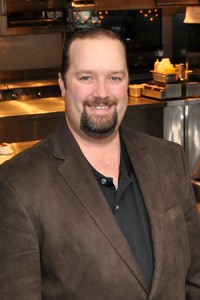 Jason Schickedanz’s journey into the realm of restaurant ownership began with a simple invitation: “Hey Jacques, let me know if you ever want to open a restaurant together.” Despite his background in the food industry, growing up on a ranch and owning a farm in the Texas Panhandle, Jason’s prior experience was primarily on the production side rather than service and retail… (click “read more” above)
Jason Schickedanz’s journey into the realm of restaurant ownership began with a simple invitation: “Hey Jacques, let me know if you ever want to open a restaurant together.” Despite his background in the food industry, growing up on a ranch and owning a farm in the Texas Panhandle, Jason’s prior experience was primarily on the production side rather than service and retail… (click “read more” above) However, armed with a robust background in business development and a passion for growth, Jason’s venture into entrepreneurship started with the creation of a highly successful government consulting firm recognized as one of the fastest-growing Aggie-owned businesses globally. This success paved the way for Jason to expand his business portfolio, developing and acquiring various companies. Currently, he is actively involved in diverse industries such as government consulting, production agriculture, aviation services, insurance, real estate, and, of course, the restaurant business.
However, armed with a robust background in business development and a passion for growth, Jason’s venture into entrepreneurship started with the creation of a highly successful government consulting firm recognized as one of the fastest-growing Aggie-owned businesses globally. This success paved the way for Jason to expand his business portfolio, developing and acquiring various companies. Currently, he is actively involved in diverse industries such as government consulting, production agriculture, aviation services, insurance, real estate, and, of course, the restaurant business.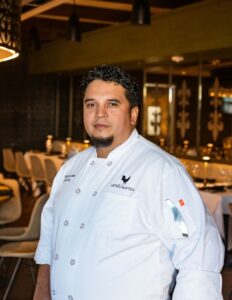 Executive Chef at Artisan Restaurant | Culinary Maestro | From Tamaulipas, Mexico to Houston, Texas
Executive Chef at Artisan Restaurant | Culinary Maestro | From Tamaulipas, Mexico to Houston, Texas
Meet Erik Cruz, the culinary virtuoso steering the culinary experiences at Artisan’s Restaurant. Born in Tamaulipas, Mexico, Erik’s journey in the culinary world began when he migrated to Houston, Texas, in the early 2000s. His passion for the art of cooking ignited at Golden Seafood House on the North side of Houston, where he started as a dishwasher and swiftly ascended to the role of kitchen manager through hard work and his lust for learning… (click “read more” above)
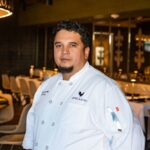 Erik’s culinary prowess continued to evolve as he spent three years at Zion’s Italian Kitchen, followed by a significant chapter at Brennas of Houston in 2009. Working alongside renowned chefs such as Danny Trace, Jose Arevalo, and Hugo Ortega at Hugo’s Cafe, Erik honed his skills and embraced the diverse world of flavors.
Erik’s culinary prowess continued to evolve as he spent three years at Zion’s Italian Kitchen, followed by a significant chapter at Brennas of Houston in 2009. Working alongside renowned chefs such as Danny Trace, Jose Arevalo, and Hugo Ortega at Hugo’s Cafe, Erik honed his skills and embraced the diverse world of flavors.
His culinary journey led him to Liberty Kitchen as an Executive Chef before finding his true calling at Artisan’s Restaurant. Over five years working with Chef Jacques Fox, Erik delved into French techniques in fine dining, refining his craft and expressing his creativity. An exciting opportunity led him to partner with Calavera Mexican Kitchen, where he not only won the Rodeo Master Best Bites but also showcased his Mexican culinary heritage.
Driven by a relentless passion for his craft, Erik returned to Artisans Restaurant as the Executive Chef. With a wealth of experience, from mastering French techniques and incorporating his Mexican roots, Erik Cruz invites you to savor a culinary experience that blends tradition, innovation, and a rich tapestry of flavors that define his remarkable journey.
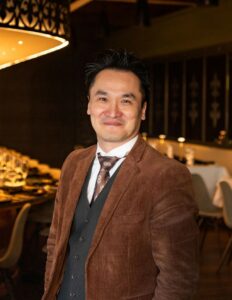 Jeremie Heng, a seasoned Director of Operations, boasts a rich international background in the hospitality industry. Born and raised in France, he holds a Master’s Degree in Economy and Management from Paris Sorbonne and a Bachelor’s Degree in Hotel Management from EHL Hospitality Business School in Lausanne, Switzerland. Certified as a Sommelier Level II, Jeremie embarked on his career in Germany, serving as F&B Assistant Director at Hamburg Schloss Hotel and later successfully launching two restaurants in Bad Segeberg.
Jeremie Heng, a seasoned Director of Operations, boasts a rich international background in the hospitality industry. Born and raised in France, he holds a Master’s Degree in Economy and Management from Paris Sorbonne and a Bachelor’s Degree in Hotel Management from EHL Hospitality Business School in Lausanne, Switzerland. Certified as a Sommelier Level II, Jeremie embarked on his career in Germany, serving as F&B Assistant Director at Hamburg Schloss Hotel and later successfully launching two restaurants in Bad Segeberg.
(click “read more” above)
 After a decade in Germany, Jeremie returned to Paris, where he assumed the role of General Manager at Richard Paris Group. In 2004, he made a mark in Houston by joining Hotel Granduca as a Hospitality Manager, eventually rising to the position of Food & Beverage Director in 2011. His journey continued with impactful roles at FeedTX (Liberty Kitchen Brand) and, in 2021, as the Senior General Manager for Culinary Khancepts (State Fare Kitchen, Liberty Kitchen, Audrey).
After a decade in Germany, Jeremie returned to Paris, where he assumed the role of General Manager at Richard Paris Group. In 2004, he made a mark in Houston by joining Hotel Granduca as a Hospitality Manager, eventually rising to the position of Food & Beverage Director in 2011. His journey continued with impactful roles at FeedTX (Liberty Kitchen Brand) and, in 2021, as the Senior General Manager for Culinary Khancepts (State Fare Kitchen, Liberty Kitchen, Audrey).
Jeremie’s passion for hospitality is boundless, cultivated through diverse experiences over the past 10 years. In November 2023, he teamed up with Chef Jacques to spearhead the opening of Artisans Restaurant in an exciting new location. Beyond his professional pursuits, Jeremie is an avid traveler, reflecting his curiosity and dedication to the dynamic world of hospitality.
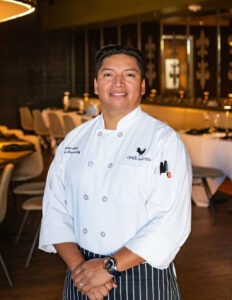 As the Executive Sous Chef at Artisans, a culinary haven showcasing the rich flavors of Italian, French, and Mexican cuisine, Glorio Hernandez, originally from San Andrés Xecul, Guatemala, has left an enduring impact on the culinary scene from 2003 to 2017. His culinary odyssey commenced as a dishwasher at Alcodoro, where he steadily advanced through sauté and pizza stations… (click “read more” above)
As the Executive Sous Chef at Artisans, a culinary haven showcasing the rich flavors of Italian, French, and Mexican cuisine, Glorio Hernandez, originally from San Andrés Xecul, Guatemala, has left an enduring impact on the culinary scene from 2003 to 2017. His culinary odyssey commenced as a dishwasher at Alcodoro, where he steadily advanced through sauté and pizza stations… (click “read more” above)
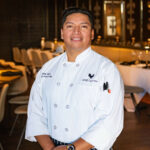 During this period, Chef Giancarlo Ferrera became a significant influence, introducing Glorio to the intricacies of Italian gastronomy and sharing invaluable culinary secrets.
During this period, Chef Giancarlo Ferrera became a significant influence, introducing Glorio to the intricacies of Italian gastronomy and sharing invaluable culinary secrets.
In 2013, Glorio played a pivotal role in the establishment of Artisans, working alongside chefs Michel and Russle under the mentorship of Chef Fox, the restaurant’s proprietor. Starting as a dishwasher, Glorio’s unwavering determination and passion propelled him to the core of the kitchen, where he honed his skills in mastering French culinary techniques.
With the expansion to a new location, Glorio earned the position of Executive Sous Chef, collaborating closely with Executive Chef Erik Cruz. This role provided him with the unique opportunity to amalgamate the French techniques he had mastered with Chef Erik’s Mexican influence, significantly enhancing his culinary repertoire.
Glorio Hernandez embodies a commitment to culinary excellence, seamlessly blending the best elements of Italian, French, and Mexican cuisine into every dish he crafts. His culinary journey serves as a testament to perseverance and an unwavering passion for the culinary arts.
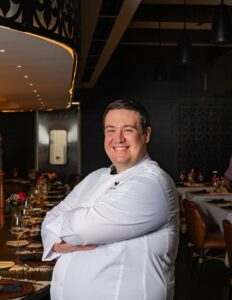 Meet Pedro Hendrichs, the Pastry Chef at Artisans Restaurant—a culinary virtuoso dedicated to crafting unforgettable sweet experiences. Pedro’s journey began at Ploughman’s Deli in 2018, where he honed his skills and deepened his love for the culinary arts. Following a transformative internship at Artisans Restaurant in the summer of 2019, Pedro’s passion for cooking was solidified.
Meet Pedro Hendrichs, the Pastry Chef at Artisans Restaurant—a culinary virtuoso dedicated to crafting unforgettable sweet experiences. Pedro’s journey began at Ploughman’s Deli in 2018, where he honed his skills and deepened his love for the culinary arts. Following a transformative internship at Artisans Restaurant in the summer of 2019, Pedro’s passion for cooking was solidified.
 In 2020, Pedro founded The Nomad’s Kitchen, a beloved food truck renowned for its innovative creations inspired by his diverse heritage. With roots in Germany, Greece, and Mexico, Pedro’s culinary creations offer a captivating fusion of flavors and traditions.
In 2020, Pedro founded The Nomad’s Kitchen, a beloved food truck renowned for its innovative creations inspired by his diverse heritage. With roots in Germany, Greece, and Mexico, Pedro’s culinary creations offer a captivating fusion of flavors and traditions.
A graduate of Houston Community College in Culinary Arts and Hospitality Management, Pedro brings a wealth of expertise to his role. Since joining Artisans Restaurant in 2023, he has continued to captivate patrons with his culinary prowess and creative flair.
Join Pedro on a journey of flavor and discovery at Artisans Restaurant, where every bite tells a story of passion, innovation, and a rich tapestry of culinary heritage.
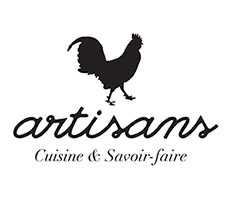 French national emblem, The Gallic Rooster or coq Gaulois is a symbol of the French nation and history, in addition to its land and culture. (click “read more” above)
French national emblem, The Gallic Rooster or coq Gaulois is a symbol of the French nation and history, in addition to its land and culture. (click “read more” above)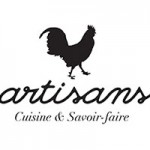 Along with Marianne of France and the lily, the Gallic Rooster symbolizes France and the French people, and he often appears on official seals.
Along with Marianne of France and the lily, the Gallic Rooster symbolizes France and the French people, and he often appears on official seals.
Gallus (in Latin): Its association with France dates back from the Middle Age and is due to the play on words in Latin between Gallus, meaning an inhabitant of Gaulle, and gallus, meaning rooster.
Its crowing at the dawning of each new morning made it a symbol of the daily victory of light over darkness and the triumph of good over evil.
That is why, during the Renaissance, the rooster became a symbol of France as a Catholic state and became a popular Christian image on weathervanes, also known as weathercocks.
Then the popularity of the gallic rooster as a national personification faded away until its resurgence during the French Revolution (1789).
The Gallic rooster had been a national emblem ever since, especially during the Third French Republic. The rooster was featured on the reverse of French 20-franc gold pieces from 1899 to 1914.
For many people, the rooster symbolizes bravery and boldness as he defends the flock against all comers, along with virility. In France, roosters were often used to decorate church bells and watchtowers, since the rooster symbolizes vigilance, as he wakes at dawn to alert people to the start of the day.
Today, it is often used as a national mascot, particularly in sporting events such as football (soccer) and rugby.
Le Coq Sportif (“The sporty rooster”), is a French manufacturer of sports equipment using a stylized rooster and the colors of the French tricolour as its logo.
